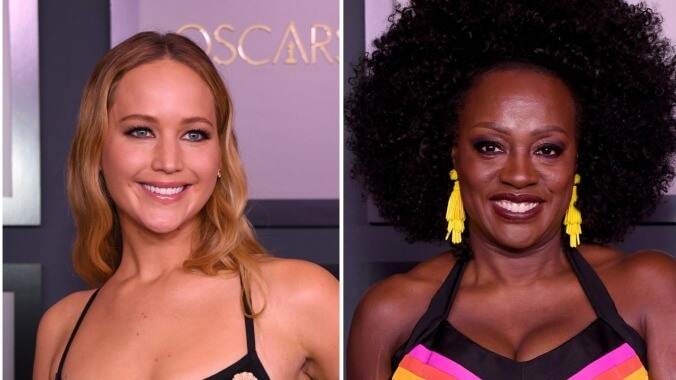Jennifer Lawrence tells Viola Davis weight loss was the "biggest conversation" around The Hunger Games casting
Jennifer Lawrence and Viola Davis talk the biggest hindrances to the craft of acting in Variety's Actors on Actors conversation

Jennifer Lawrence and Viola Davis are both critically acclaimed, Oscar-winning actors who also happen to have ample experience with blockbuster and franchise filmmaking. In Lawrence’s case, she’s been open about how franchise films affected her career as a whole. In her Actors on Actors conversation with Davis (via Variety), she elaborates on some of the hardships of her roles in X-Men and The Hunger Games.
Of the superhero series, she admits, “It’s hard to not have that perception of the movie that’s like, ‘Oh, well, it’s just one of those.’” Lawrence adds, “Especially when you’re painted blue with scales on your face. If you start thinking, ‘I look ridiculous, I feel ridiculous,’ there’s nowhere to go.”
Lawrence calls The Hunger Games “an awesome responsibility,” reflecting, “Those books were huge, and I knew that the audience was children. I remember the biggest conversation was ‘How much weight are you going to lose?’ Along with me being young and growing and not able to be on a diet, I don’t know if I want all of the girls who are going to dress up as Katniss to feel like they can’t because they’re not a certain weight. And I can’t let that seep into my brain either.”
“How much of the business has infiltrated your love of the work?” Davis ask. Lawrence remarks that the runaway success of The Hunger Games means she “couldn’t really be an observer of life because everybody was observing me.” She shares, “I could feel my craft suffering. And I didn’t know how to fix it. I was scrambling, trying to fix it by saying yes to this movie and then trying to counteract it with that movie. And not realizing that what I had to do was no movies until something spoke to me.”
Doing press and interviews is also a hindrance to the craft because, Lawrence says, “I’m supposed to be a mirror. I’m supposed to be a vessel.” Meanwhile, Davis cites some of her training at Julliard (“Or should I say the jail yard?”) as having held her back, focusing too much on “technical proficiency.”
“[No] one wants to see a play or a movie and look at technical proficiency; you want a human experience. You want to feel less alone. They don’t get at that,” Davis explains. Citing teaching techniques like putting a pencil in students’ mouths to adjust their tongue positioning, she says, “When it gets like that, and you leave yourself and your soul behind, you’re not an artist.”
“And on top of that, it’s Eurocentric training,” Davis adds. “So when you’re studying all those classics, it’s clear what all of those characters look like —and that’s not me. So then what am I supposed to do with me? What am I supposed to do with my Blackness? What am I supposed to do with my deep voice and my wide nose?”
Luckily, Davis and Lawrence have found individual success (and critical acclaim with this year’s films The Woman King and Causeway) in spite of these particular challenges, and both praise each other for the beauty and humanity of their work. Their full Actors on Actors conversation can be seen on Variety here.